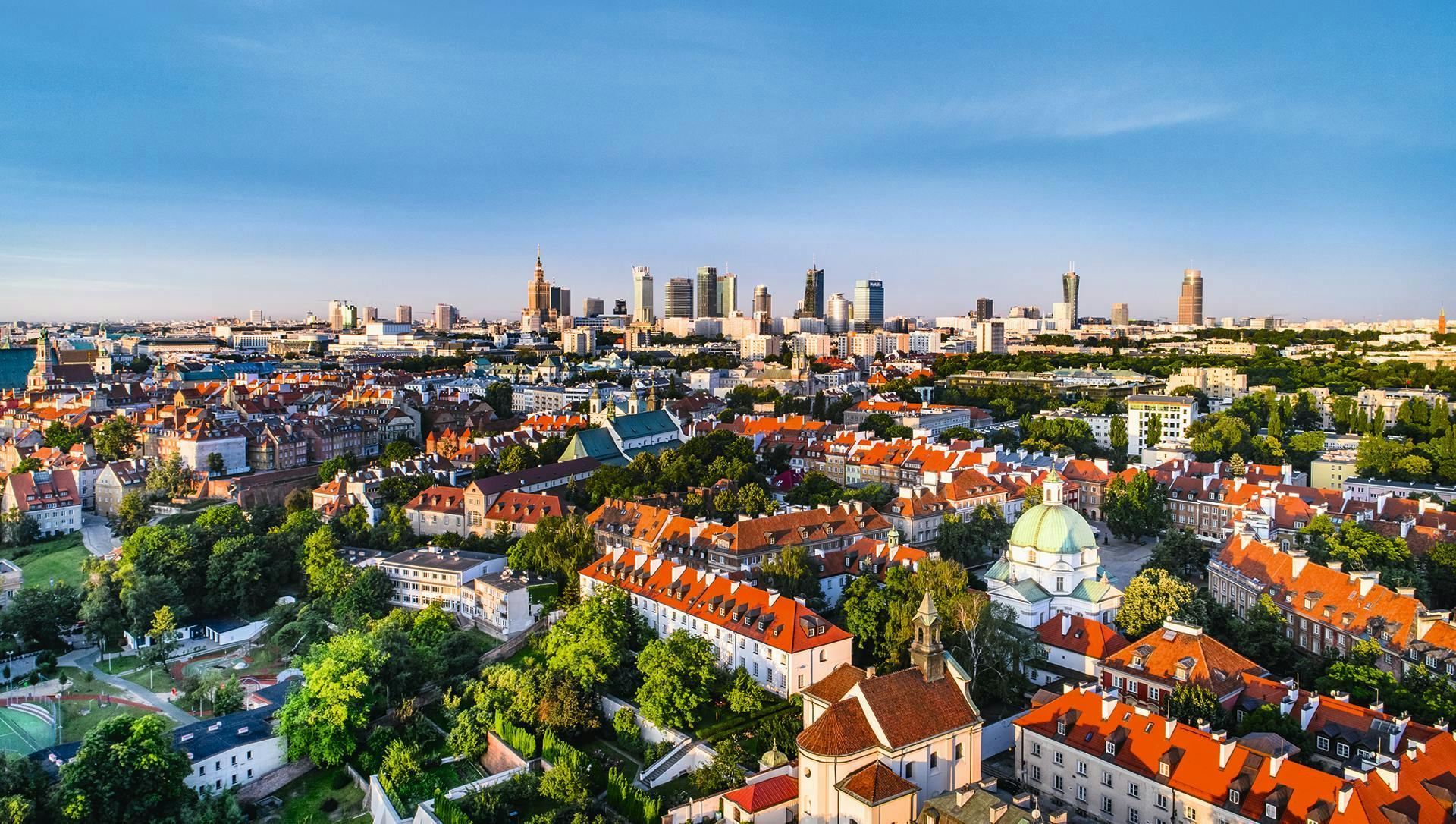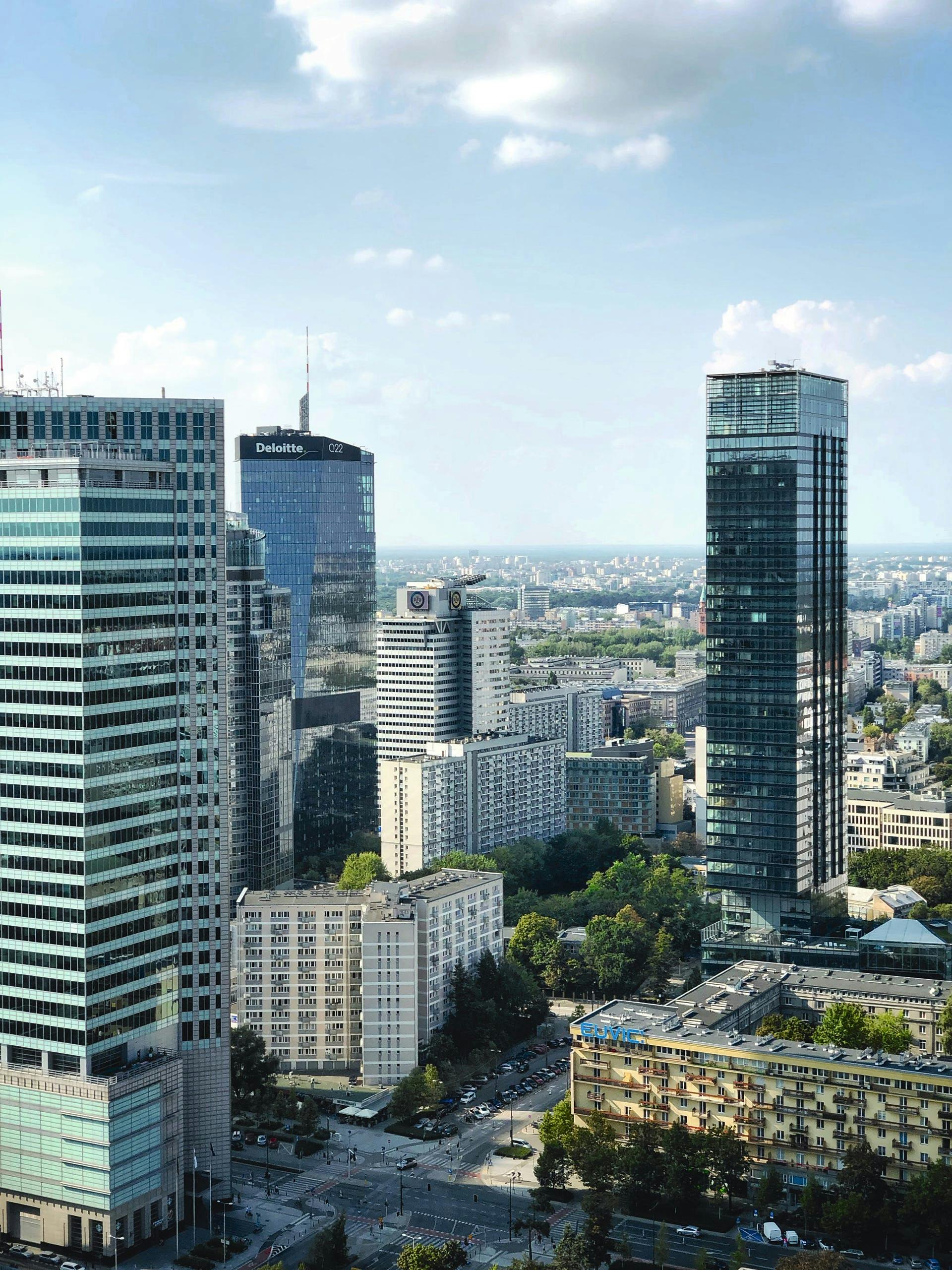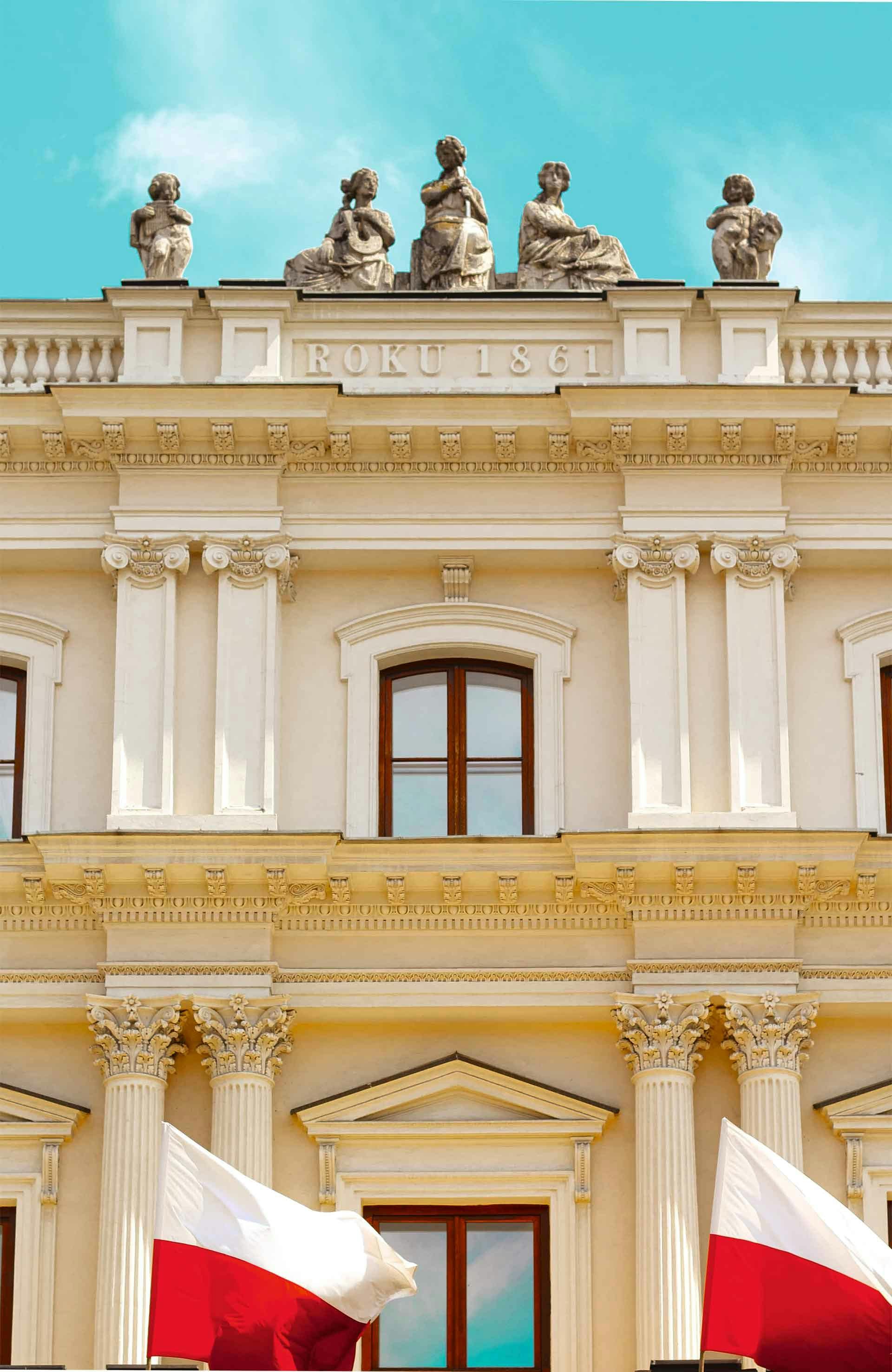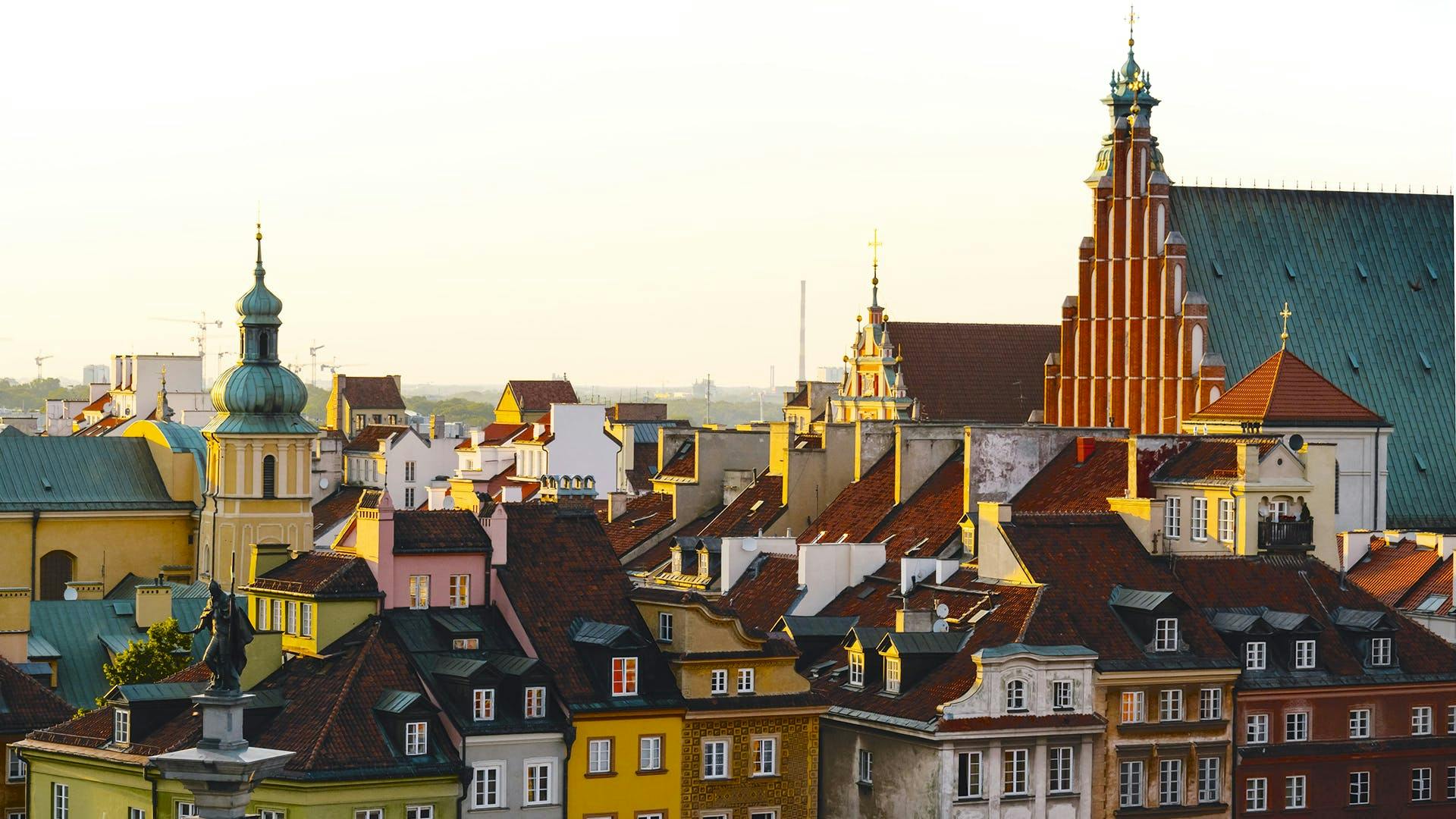Starting up in Warsaw
arsaw is the capital and largest city of Poland, the biggest economy in Central and Eastern Europe (CEE). With a metropolitan area home to over three million people, it boasts a thriving cultural scene and one of the highest proportions of green space of any urban area in Europe. The city’s rebuilt old town is a UNESCO World Heritage Site featuring virtually every era of European architectural history.

Informed by Startup Guide Warsaw, which was created in partnership with Venture Café Warsaw, here’s what you need to know if you are planning to live and start a business in this city.
Warsaw, strategically placed at the midpoint between London, Moscow, Stockholm and Budapest, has also been at the forefront of Poland’s growth this century in sectors such as IT, business services and gamedev. As Poland’s economy has advanced dramatically with the highest growth rate across the continent since 1990, Warsaw has a high potential to become a deeptech hub.
Google and Microsoft are just two of the industry leaders to have set up their own hubs in Warsaw for work in areas ranging from cloud solutions to biotech. This advance in the deeptech industry has followed the development of higher education in Poland. Warsaw University of Technology is one of the leading tech institutes in Europe, while the University of Warsaw ranks in the top few CEE universities. As a result, Polish software developers are rated the third best in the world. Warsaw is also among the top ten financial centers in CEE, and the number of cargo shipments its Warsaw Chopin Airport processes is rising 15 percent annually. Prior to the COVID pandemic, the city attracted ten million tourists in the average year.
Before you come
Although summers in Warsaw are generally warm, it is known for subzero temperatures in winter. You’ll need to pack something for each season and include snowproof clothing. House-hunting is challenging, so searching online before arriving can help. Be prepared to stay at a hotel, a short-term rental or with a friend while searching. Once you are a resident in Warsaw, you must register your address with the local authority, which requires a tenancy agreement and proof of your right to reside in Poland or another Schengen-Area country. Driving licenses for any EU or EEA country are valid to use in Poland. If your driver’s licence is not from EU/EFTA, it is valid for six months in Poland from the day you register yourself in Warsaw. After this, you are required to pass a driving-theory test to exchange it for a valid Polish licence.
Warsaw fuses traditional elements of Polish culture with the conveniences of a modern European capital.
Visas and work permits
Poland is a part of the European Union’s Schengen Area, meaning any EU-national is free to live, work and start a business there, as are third-country nationals with permanent residence, long-term EU residence, a spousal visa, or student or research residence. For other third-country nationals, fully licensed and incorporated employers must sponsor and secure a visa and work permit for prospective employees. They must conduct a labor-market test to prove there is no eligible Polish or EU national who could be employed instead. This test is not needed if the local Voivode (official) has included the particular field of work in a list of high-demand jobs. Work permits have a duration of three years, but, depending on the type, work visas may last only six months or one year. The entire visa application process generally takes three to four weeks for approval, but may extend to up to eight weeks.
You can obtain permanent residence (and eligibility for citizenship after five years) by investing a minimum of €100,000 ($118,300) in a form of Polish commercial activity. You can also secure a temporary residence permit by setting up a startup that is able to generate €15,000 ($17,700) a year. After three years of temporary residence on this basis, you will qualify for permanent residence. Investment in real estate qualifies as a form of commercial activity in both of these cases.

Photo: Bianca Fazacas / Unsplash
Cultural differences
Warsaw fuses traditional elements of Polish culture with the conveniences of a modern European capital. You can sample the staple Polish delicacies such as pierogi (crescent- shaped dumplings) gołąbki (stuffed cabbage leaves) and kanapki (open sandwiches) at any local restaurant or bar mleczny (milk bar). Warsaw is becoming a vegan-friendly city offering vegan food prepared from local products. Breakfast is popular and can be served up until 2:00 PM. In warm weather, open-air breakfast markets are held on weekends. Obiad (lunch) is usually taken after 2:00 PM.
Polish mead is experiencing a revival in popularity, as many Warsaw pubs and microbreweries will attest to. Festivals run throughout the year, from the traditional Procession of the Three Kings in January to the Festival of Contemporary Music in the fall and open Chopin concerts in a historic park. Polish people value generosity, courtesy and the reciprocation of these values. They tend to build personal relationships when doing business. As when moving to any country, it is important to maintain respect and familiarize yourself with the country’s history before starting any conversations about more sensitive topics.
Cost of living
At the time of writing, the Polish złoty (zł) exchanged at an average of 3.82 zł to the US dollar and 4.55 zł to the euro. The Mapping the World’s Prices 2019 report by Deutsche Bank lists Warsaw as having the twelfth lowest cost of living. A single person’s average monthly expenses without rent are approximately 2,823 zł ($740), and the average monthly salary is 4,580 zł ($1,199). A two-room apartment of 50 m2 located in central Warsaw costs 2,500 zł ($617) to 3200 zł ($838) per month to rent. Household bills could come to 1,000 zł ($260), while public transport passes are 110 zł ($26). On average, a 500 ml glass of local beer costs 12 zł ($3) and a two-course meal including soup comes to 30 zł ($8).
Poland’s government-funded, insurance-based health system affords large parts of society, including employees and their families, free healthcare. This applies to all residents, including those with temporary permits. However, private health insurance is commonly provided to foreign employees by their companies.

Photo: Victor Malyushev / Unsplash
Accommodation
rentflatPOLAND is specifically designed for house-hunting in Poland as an expat. The housing sections of Gratka and OLX also have listings updated daily. There are groups on Facebook also dedicated to searching for accommodation in Warsaw. It is acceptable to take a room in shared accommodation if necessary.
There are two types of rental agreements with landlords allowed in Poland: private (informal) agreements akin to subletting and formal tenancy agreements. Informal agreements are common but can cause paperwork issues for the tenant; for example, when they try to open a bank account. Tenancy agreements typically have a duration of six or twelve months. Guarantors are usually not required, but there could be a deposit payment of two or even three months’ rent up front. Household bills tend to be excluded from the agreement.
Insurance
Social Insurance is compulsory for anyone who works in Poland, payable in part by employers and in part by employees. This insurance breaks down into several categories, the main ones being pension insurance (split equally between the employer and employee), disability pension insurance (covered largely by the employer), health insurance, and accident and illness insurance (covered by the employee).
The Polish Investment and Trade Agency (PAIH) gives a full breakdown of Social Insurance payment rates. Those who are self-employed usually cover the whole cost of both parts of their insurance, but if you are on a umowa zlecenie (commission contract) the Polish Social Insurance Institution (ZUS) covers your retirement, disability and health insurance.

Photo: Bianca Fazacas / Unsplash
Starting a company
The conditions for registering a company in Warsaw depend on whether you are starting a capital company, a partnership or a sole proprietorship. For a sole proprietorship, extra restrictions apply for citizens who are not from the EU, UK, US or Switzerland. No startup capital is needed to register a partnership, but a limited liability capital company requires 5,000 zł ($1,309) in investment, and a joint-stock capital company would need to raise 50,000 zł ($12,350). Although you don’t need to be a resident to start a company in Poland, it must have a Poland-based director and you would need a business visa to travel to Poland to work there. Even then, the success of the application is not guaranteed. Hiring at least two Polish employees in your company would increase your chances.
When registering your company, you can consult the Polish government’s business website for help. For direct advice, they also have a virtual assistant and phone number accessible. You may need a fluent Polish-speaker to translate for you, which is also advisable for the registration process itself. If registering a sole proprietorship and using your home address in Warsaw, you should inform your landlord, as they may be charged extra property taxes. The fee varies, and the process is carried out by district courts, taking around two weeks.
Opening a bank account
You need only a residence permit and a passport to open a bank account in Poland. Certain banks that market to foreigners, such as Santander Bank Polska, ING Bank Śląski and Millennium Bank may need only your passport and proof of residence in your country of origin. The four biggest banks in Poland (PKO BP and the three mentioned above) offer both business and personal banking.
You can transfer up to €10,000 ($11,500) to or from accounts in Poland without any declaration. ATMs (Bankomat) are widely available in Warsaw, though in more rural areas it is advisable to bring cash. Machines charge fees for foreign credit and debit cards. In most cases, you need a bank account in Poland to start a business there, unless it is a micro-company with few employees and a low turnover. For sole proprietorships, it is possible to run the business through your personal bank account with lower fees, although this may cause complications with paperwork.

Photo: Milana Jovanov / Unsplash
Taxes
The standard corporation tax rate in Poland is 19 percent. There is no separate capital gains tax. Companies with revenues below €2 million ($2.2million) may apply for a lower corporation tax rate of 9 percent. See the Polish government’s business website. An additional minimum business income tax, deductible from standard corporation tax, was introduced in 2022 to target tax avoidance. It is levied on corporations reporting minimal profits or losses, at a rate equivalent to 10 percent of their tax base. The standard VAT rate is 23 percent but there are reduced rates of 8 percent and 5 percent on gas, electricity, particular foods, media and services.
Income taxation in Poland is progressive with two brackets. The upper bracket pays 15,300 zł ($4,000) plus 32 percent on the excess over 120,000 zł ($31,400). Income tax is paid by all residents and non-residents employed in Poland. Personal income tax declarations are submitted annually between February and April 30. Companies in Warsaw are subject to research and development tax breaks, and new low-income enterprises have an exemption on 30 percent of their corporation tax for the six years after the launch of their product, check the official website for more information.
As Poland’s economy has advanced dramatically with the highest growth rate across the continent since 1990, Warsaw has a high potential to become a deeptech hub.
Phone and internet
Prices for monthly mobile phone plans in Poland range from 5 zł ($1.30) to 71 zł ($19). Popular providers are T-Mobile, Orange Polska, Play and Plus. Contract lengths tend to be one year. Home internet plans are usually two years. Netia is the exception with a nine-month contract offer, and Play offers a pay-as-you-go option. The main option for business internet is DSL TP from Orange Polska. Orange Polska also provides one of the two main plans for home internet, along with Netia’s Net24. Download speeds tend to vary between 10 Mbit/s and 80 Mbit/s. The average internet bill for 60 Mbit/s or more with unlimited data is 71 zł ($19).
Getting around
Warsaw is the intersection for major road, rail and air routes across Central and Eastern Europe. Warsaw Chopin Airport is 10 km from the city center and easily reachable by train, bus or taxi, and Warszawa Modlin Airport serves several budget airlines. Express trains run daily to and from Berlin, Vilnius, Kiev and Moscow, among other cities, with discount prices when booked in advance. Kraków is two and half hours south on the InterCity railway, and Gdansk is three and half hours north. Within Warsaw, two metro lines, a tram and a day-night bus system are all fast and efficient ways to get around. The city’s roads are usually congested, but Warsaw’s electric scooter and public bike-sharing systems offer an alternative. You get a free twenty-minute ride each time you rent a bike from one of the three hundred stations around the city. There are over 680 km (422 miles) of cycle paths to explore. Uber and Bolt are also readily available at low prices.

Photo: Adam Borkowski / Unsplash
Learning the language
The EF English Proficiency Index (2021) ranks Warsaw as the fourteenth city in the “Very High Proficiency” band globally. Although you can get by without learning the language, doing so will be a big plus when starting a business, especially in handling administrative tasks with local authorities. Any effort you put into speaking Polish will be greatly appreciated by locals, and older Poles tend not to speak English. Polish may seem intimidating when you see it written down, as there are so many accents and pronunciation doesn’t always follow spelling. It does use the Roman alphabet, though, unlike other Slavic languages, and immersion is the key to getting used to the sounds. Polish language courses in Warsaw range from individual tutors to group classes and intensive, slower-paced programs, and a standard one-hour class can cost around 60 zł ($16), for example at the British Council language school.
Meeting people
Pub crawls are customary for giving newcomers to Warsaw the chance to get to know the city and meet new people. There are many organizing groups on Facebook and TripAdvisor, and a website dedicated to the custom. Meetup offers several Warsaw-based English language groups, including one for expats and another for language exchange, and a Discussion and Inspiration group for Digital Society and Culture. The Professional Women’s Network has an active chapter in Warsaw, and there is the Warsaw Network: a forum of think tanks linked to the Warsaw Enterprise Institute which holds its own events. You can rent a place at dozens of coworking spaces dotted around the city, including several Regus locations, for as little as 25 zł ($6.50) a day. Most of the startup events in Poland take place in Warsaw, such as Pixel Heaven, Women in Tech Summit or Venture Café Thursday Gatherings, attracting many tech specialists and entrepreneurs, while Venture Café Warsaw’s District Hall at the city’s Cambridge Innovation Center describes itself as the “first public innovation center in the world.”
Want to know more about Warsaw’s startup scene? Startup Guide Warsaw includes valuable tips, founder stories and expert insights. Order your copy now!
Written by Sarah Nagaty
Repackaged by Anastasia Ilcov


